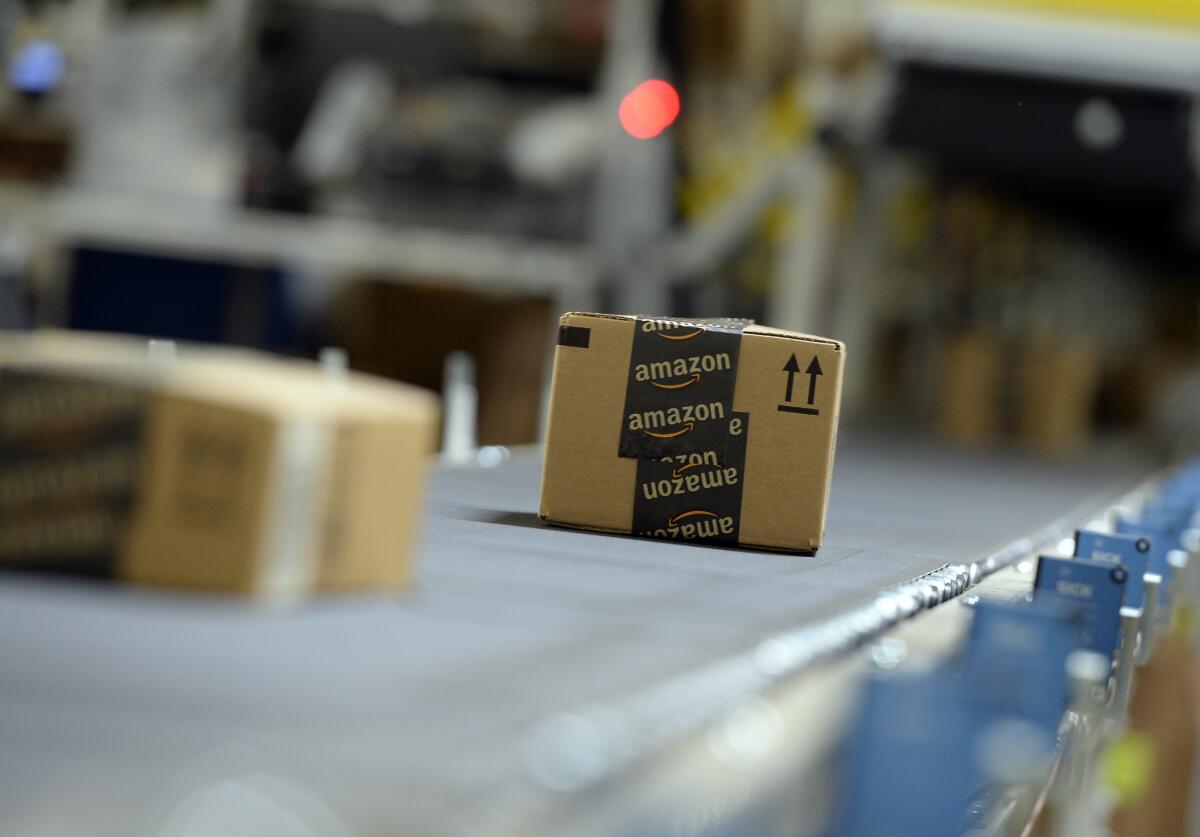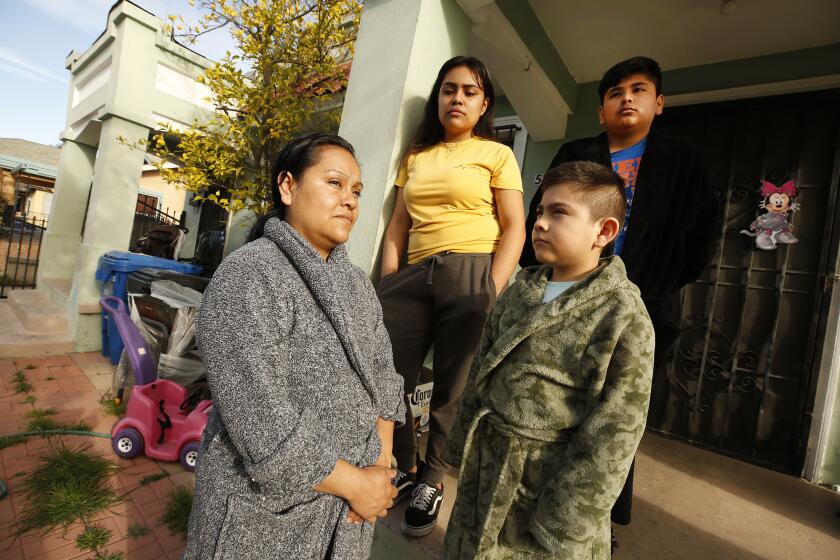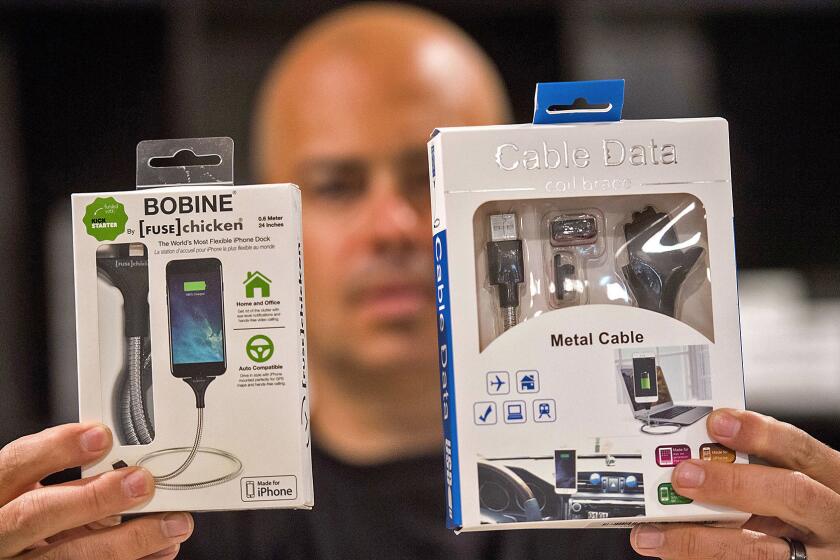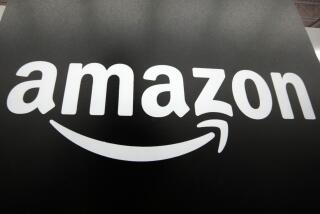That toilet paper you bought on Amazon? You may be waiting a while
- Share via
The toilet paper promised to be “gently textured” yet “durable enough for the task at hand.” The package’s lettering was in Chinese, save for one word: “Face.”
It wouldn’t come for several weeks, and at $23.90 for 10 rolls, it seemed pricey. But it was available for purchase immediately.
So, on March 20, I did what countless other anxious Americans have done during the coronavirus outbreak: I clicked the “Buy Now” button on Amazon.
It’s been more than three weeks since I placed my order with the seller in Guangzhou, China, and I’m still waiting. A parcel tracking website indicates that China Post has created a logistics order for my toilet paper. Destination: Finland. (I live in L.A.)
“It’s likely that you will never receive your toilet paper,” said Juozas Kaziukenas, founder of e-commerce research firm Marketplace Pulse. “I would not bet on it. Or you will receive a product that is not what you are expecting — specifically a lower-quality product or a different product altogether.”
Amid the pandemic, toilet paper is in short supply at many stores. With health officials now urging Americans to further cut back their grocery runs, shoppers like me have gone online, making “toilet paper” the No. 1 search term on Amazon since early March.
Enterprising operators in the Amazon Marketplace, the home of third-party sellers, have moved quickly. Taking advantage of the dearth of online stock from U.S. brands, they’ve flooded the Marketplace with toilet paper that’s mostly from overseas — products never intended for American homes.
Toilet paper is a bulky item with a low price — not exactly a formula for high profits when shipped internationally. So how exactly does the e-commerce toilet paper trade work, and how is anyone making money from it?
The answer to both questions is complicated.
A hotel housekeeper, victim of a coronavirus layoff, struggles to support her three kids. ‘I just want to keep my little family together,’ she says.
There are vendors in Amazon’s new toilet paper economy that are indeed delivering on their promises, but e-commerce experts said others appear to be carrying out byzantine schemes that are difficult to monitor and, in some cases, even fully understand. Certain sellers are offering toilet paper that doesn’t match product descriptions. Others, experts said, could be peddling nonexistent items, leaving consumers empty-handed — or, given the circumstances, caught with their pants down.
Recent one-star reviews left for Amazon Marketplace sellers described a litany of issues, many bordering on absurd.
“The company charged $127.96 for toilet paper that never arrived,” one review said. “The dates of delivery were moved back multiple times with NO DELIVERY of the toilet paper!”
“I ordered 20 rolls of toilet paper and after a month got 10,” read another that complained of shipment in a “filthy black bag.” It continued: “And are you kidding me WE ARE GOING THROUGH A WORLDWIDE PANDEMIC.”
“This is HIGHLY misrepresented,” another said. “With no exaggeration, the size of each roll of toilet paper is not much larger than the size of a roll of register tape.”
Amazon acknowledged in a statement that there are “bad actors” in the Marketplace but said that it uses a “range of rigorous fraud detection and prevention measures” to proactively protect customers. Among the Seattle company’s efforts is a vetting process that blocks ill-intentioned operators “before they are able to provide a single product for sale.”
“As a result, bad actors that attempt to abuse our systems make up a tiny fraction of activity in our store,” Amazon said.
A large swath of the mushrooming toilet paper business in the Marketplace is coming from China, recent Amazon sales show. An analysis of 306 one-star seller reviews mentioning toilet paper that were left from March 18 to April 8 found that 172 of the reviews — or 56% — were for third-party sellers in China, according to data provided to The Times by Kaziukenas, whose company tracks millions of online sellers.
Beth Franssen was let down by the 10 rolls of toilet paper she bought from a seller in Quanzhou, China, for $28.70.
“They are doll-sized rolls,” said the L.A. County resident, who used a ruler to confirm the Element brand rolls she bought were smaller than what was advertised on Amazon. “The picture didn’t represent what it is at all.”
Efforts to reach Marketplace sellers in China, including the ones Franssen and I made purchases from, were unsuccessful. A handful did not respond to interview requests sent via Amazon’s messaging service, and Times journalists in Beijing could not reach several via local means, with phone numbers for some not working and physical addresses incomplete or inaccurate for others.
The Times provided Amazon with details about several poorly reviewed Marketplace offerings, including the product I purchased, which is scheduled for delivery by May 1. The company said it did not find evidence that customers were defrauded and were not receiving their orders, although it noted that it did see a small number of complaints from shoppers regarding products not arriving in the expected condition.
Amazon’s “A-to-z Guarantee” lets customers request a refund if they experience a problem with a third-party seller up to 90 days after the final estimated delivery date. That may not make up for the aggravation these transactions cause.
“Part of Amazon’s job is to protect customers and prevent them from making a mistake and buying from someone who is high risk,” said James Thomson, a partner at Buy Box Experts, which advises Marketplace sellers. “They are not adequately protecting customers.”
In normal times, customers can find major U.S. toilet paper brands for sale on Amazon. But these are not normal times, and that inventory is mostly sold out. What you can find readily available via Amazon Prime, the subscription service with expedited shipping, are novelty rolls featuring the images of politicians including Barack Obama and Donald Trump and ribald, defecation-themed messages.
But customers who want more straightforward offerings can find options in the Marketplace, a sprawling virtual bazaar for third-party sellers that allows Amazon to vastly increase the inventory offered on its website without raising overhead.
Jon Fawcett wanted to build a cellphone cable that wouldn’t fray.
The company profits by charging a commission for each Marketplace transaction, with most sales incurring a fee ranging from 8% to 20%. But the platform has brought Amazon trouble, with issues such as counterfeiting and fake reviews as millions of sellers compete for customers’ dollars.
In March, Amazon suspended thousands of seller accounts that appeared to be jacking up prices on items such as N95 masks and “gated” certain products, such as hand sanitizer, requiring sellers to gain approval before offering them. That hasn’t happened for toilet paper.
“They are not going to gate everything,” said Chris McCabe, who runs ecommerceChris, an Amazon seller consulting firm. “The more they gate, they are excluding people from potentially selling something and costing themselves that way.”

Third-party sellers appear to have found a lucrative business, according to sales data provided to The Times by Thomson, who used the analytics tool Jungle Scout to generate the information.
For example, over the 30-day period that ended April 9, a 10-roll pack of Face sold 800 times from multiple sellers, generating about $21,000. A 12-roll pack available via the same page sold 2,300 times, accounting for about $71,000.
“It’s a pretty good way to make a lot of money quickly,” Thomson said.
Considering the delivery window for the Face toilet paper that I bought spanned from April 10 to May 1, I should have known that this was not a good way to receive such an important household item quickly.
I told two Amazon experts about my purchase, both of whom examined the Marketplace listing for the item and told me — in gentle terms — that I’d made a mistake.
At the time, the product had no reviews. But the seller had a few, including a one-star missive written the day I made my purchase. Since then, the seller has received many other one-star reviews, including some from customers complaining about not receiving their orders; over the last 30 days, 63% of the seller’s reviews were negative.
“In a time of need we sometimes bypass these yellow flags, but the problem is you [probably] just lost $20,” said Thomson, a former Amazon executive.
Feeling hustled, I asked Thomson and others for a broader lesson in how questionable sellers on the Marketplace could be operating. I wondered how a merchant could profit from selling something it might not really ever plan to ship. The experts obliged.
First, sellers create listings with reasonable prices. High prices would trigger Amazon’s “anti-gouging algorithms,” Thomson said.
They usually set shipping estimates at two to six weeks. The lag may lead a buyer to forget about the purchase and therefore not complain if it never comes, allowing the seller to pocket the proceeds. This could be more prevalent now because many people are preoccupied with, well, more pressing issues.
“Who remembers what happened a month ago?” McCabe said.
Customers who notice they never received an item can ask for their money back. And Amazon described forceful actions it takes when it detects fraud: “We notify and refund customers if we believe they will not receive their order, block the bad actor, withhold funds disbursement, and work with law enforcement to hold them accountable by pursuing civil and criminal penalties.”
Amazon’s protocols also protect it from paying out the proceeds it collects from buyers to bad actors. For newly registered sellers, the company said it retains payments for a week after the expected delivery date to cover returns, refunds or other issues.
Those protections safeguard Amazon, but they may be cold comfort for consumers who find products to be of poor quality or different from what was advertised. As with Franssen, some may ask the seller for a refund. But there still could be room for the merchant to profit. After a back-and-forth with the seller, Franssen was given a refund of $8.82 — less than a third of what she paid.
“Knowing what I know now, I would definitely be cautious about anything I ordered that has a long lead time like that and is coming from China,” Franssen said. “And I’d definitely make sure I’d investigate the store’s reviews.”
The manufacturers of the toilet paper being hawked by third parties don’t appear to be thrilled. Several didn’t respond to requests for comment. After being alerted to the situation by The Times, Georgia-Pacific, maker of Quilted Northern and Angel Soft toilet paper, advised customers to check whether products are “being sold by Amazon directly or by a third-party seller.”
And as for the Face brand of toilet paper, The Times also tried to contact the company that makes it: C&S Paper Co. of Zhongshan, China. Reporters were hung up on multiple times.
If my toilet paper doesn’t come by May 1, I will ask for a refund. Assuming I get my money back, e-commerce veterans wonder whether the seller will still have been able to make some money off me, perhaps by pawning my name and address to data brokers.
“This is part of the chaos of Amazon Marketplace,” Kaziukenas said.
At least one Marketplace customer who purchased Face toilet paper from the same page apparently received it. A one-star review titled “Customers beware” that was posted there April 11 warned that the “rolls are very small and feel more like paper towels.”
But I’m down to nine rolls, so even that would do.
Alice Su and Nicole Liu of The Times’ Beijing bureau contributed to this report.
More to Read
Inside the business of entertainment
The Wide Shot brings you news, analysis and insights on everything from streaming wars to production — and what it all means for the future.
You may occasionally receive promotional content from the Los Angeles Times.













